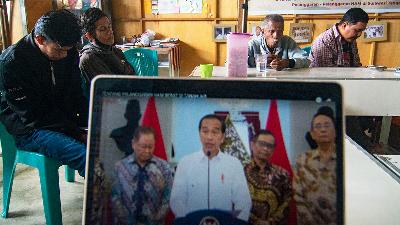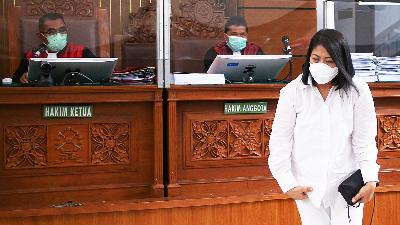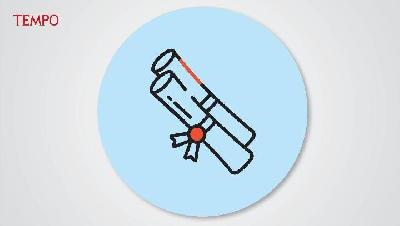Illegal Nickel Laundering
Monday, January 23, 2023
Mining companies launder illegal nickel all the way to smelting companies. They pay coordination fees to law enforcement officers.
arsip tempo : 174547067868.
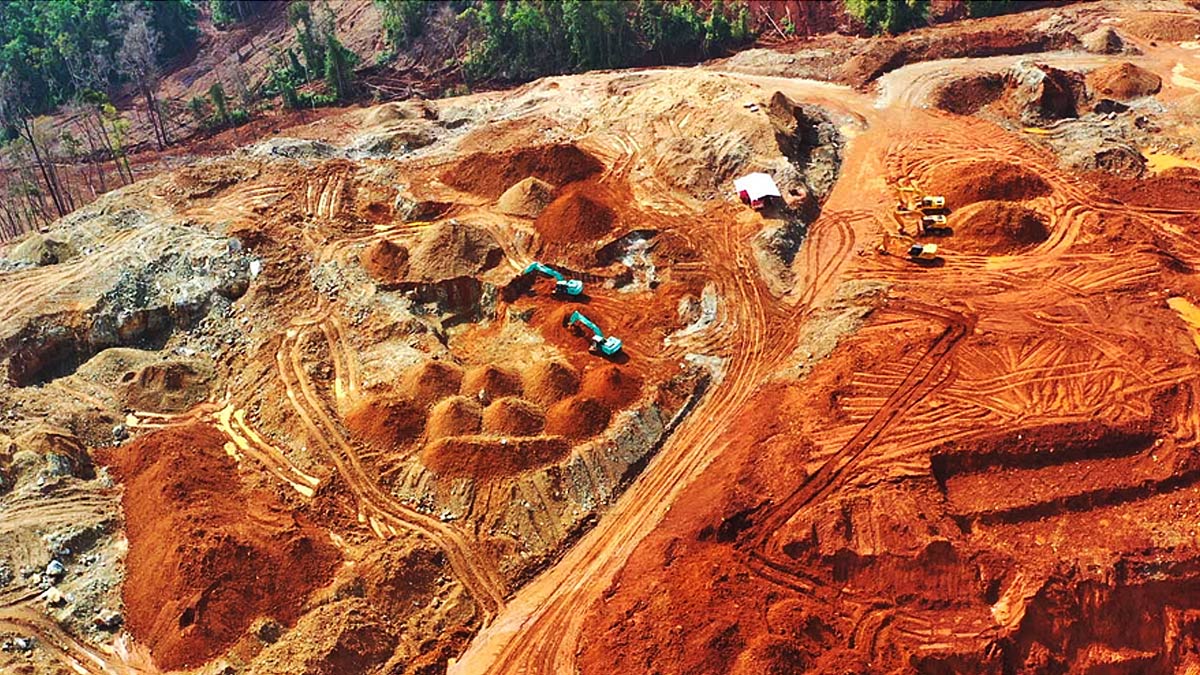
THE early afternoon’s quiet in Mandiodo Hill at the end of November 2022 was interrupted by the grumble of six excavators, which had arrived to extract nickel. The hill, 20 meters above sea level, is connected by a one-kilometer rocky road to Kilometer 83 of the Trans-Sulawesi Road, which spans 298.4 kilometers from Kendari, the capital city of Southeast Sulawesi, to Morowali in Central Sulawesi.
The yellow and tosca excavators extracted, collected, and moved brown soil into the box of 18-ton-capacity trucks lined up next to them. After their open boxes were filled, the green trucks crawled downhill toward a port in the Mandiodo Bay two kilometers away. The port in North Konawe, Southeast Sulawesi, is located next to the Molawe fishing port.
Two 10,000-ton barges were waiting at the port, one named Langkat Jaya IX. The three trucks transporting nickel from Mandiodo immediately took turns discharging the soil onto the two barges as soon as they arrived at the port. The two barges would then bring the nickel to a smelter or refinery in Morosi, 66 kilometers away, and to a smelter in Morowali, 166 kilometers away.
According to Slamet Riyadi, Mandiodo villlage head, there has not been as much nickel mining in his village since September 2022. As such, dozens of trucks and heavy machinery have been parked at the port. One excavator has even been buried in soil. “There was a raid on illegal nickel,” said Slamet. “It used to be super crowded.”
The National Police Criminal Investigation Department (Bareskrim) has officially shut down Aneka Tambang’s (Antam) nickel mining concession. The 3,400-hectare concession in Madiodo has been one of Southeast Sulawesi’s nickel centers. It is part of Antam’s 16,000-hectare concession area, estimated to store more than 7 million tons of nickel ores. Its strategic location—close to the sea—has seduced miners to secretly mine the area, just like what the six excavators have done.
Antam’s nickel mining concession overlaps with Sangia Perkasa Raya’s area. The two companies were in dispute since 2010, until the court ruled in favor of Antam in 2021. During the conflict, the forest area utilization permit (IPPKH) was never issued. IPPKH is a permit issued by the environment and forestry ministry. Without an IPPKH, a mining business permit (IUP) holder should not be able to mine nickel ores in a forest area.
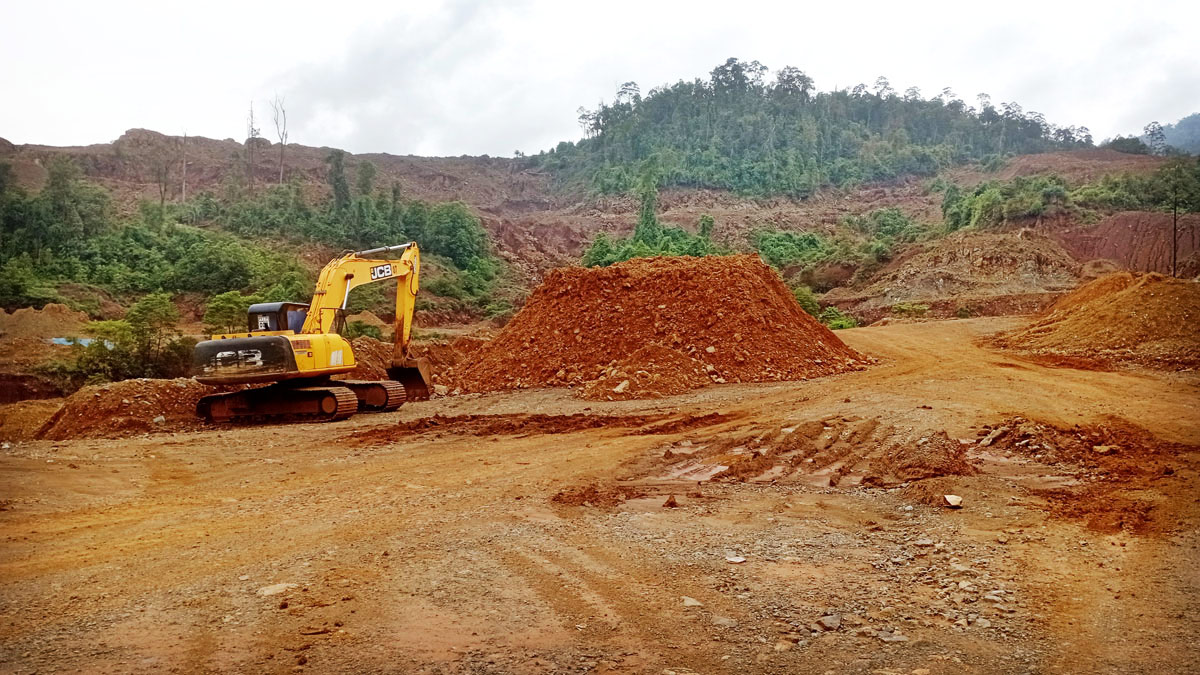
Heavy equipment loads nickel ore to a truck in Mandiodo, North Konawe, Southeast Sulawesi, November 23, 2022. Photo: Tempo/Erwan Hermawan
Sangia Director Ikhsan Erdiansyah denied that the six excavators and three trucks transporting nickel from Mandiodo belong to his company. According to him, Antam has not received their IPPKH, which means there should not be any mining activity there. “Illegal mining has grown rampant,” he said.
Antam’s IPPKH for Mandiodo has not been issued because it is still in dispute with 10 other companies that also claim the concession area. There was also mining activity in another area, which used to be Hafar Indotech’s concession, at the end of November 2022. “They’re not our heavy machinery,” said Sutikno, Director of Hafar Indotech.
So, who owns those excavators? According to Sutikno, it is no secret that illegal nickel mining has taken place in Mandiodo since 2011. But he was reluctant to name the people behind the companies responsible. “They have formidable protector,” he said.
Bareskrim’s Director of Special Crimes, Brig. Gen. Pipit Rismanto, who led the raid on illegal mines in September 2022, said illegal mining has disappeared from Mandiodo. He forwarded a WhatsApp message from Southeast Sulawesi Police Director of Special Crimes, Sr. Comr. Bambang Wijanarko, to Tempo. According to Bambang, companies currently mining nickel in the Mandiodo Block are contractors that received a work order from Lawu Agung Mining.
Lawu is a company that has an operation partnership (KSO) with Antam to excavate nickel in Mandiodo, Tapuema, and Tapunggaya. For exploitation, the company works with Southeast Sulawesi Regional State-Owned Enterprise (SOE). According to the KSO document dated December 22, 2021, Antam assigned Lawu to excavate 7.8 tons of soil in an area of 3,400 hectares in the Mandiodo Block for three years.
Lawu then appointed 11 contractors to mine nickel in Mandiodo, among others, Piramida Ore Mineral. Rahmat Jaya Rahman, Piramida’s President Commissioner, admitted that his company received a contract to mine nickel from Lawu in a non-forest area (APL) that formerly was the concession land of Hafar Indotech. Because the company only has three excavators, Rahmat excavates a maximum 800 tons of nickel per day. “In a month we get 5,000 to 7,000 tons at the most,” he said.
The problem is, Lawu and its subcontractors, even Antam, do not yet own an IPPKH as a requirement to mine nickel. “Until the end of 2022, as far as I know, an IPPKH had not been issued for Antam,” said Andi Baso, Head of the North Laiwoi Forest Management Unit, North Konawe. In other words, no permit has been given for nickel mining in Mandiodo.
Syarif Faisal Alkadrie, Antam’s Secretariat Division Head, said his company and the company with a KSO already have the work program and budget (RKAB) approved by the energy and mineral resources ministry. Their mining area does not lie within a forest, which means that they do not need an IPPKH. Energy Minister Arifin Tasrif confirmed that the mining SOE already had an RKAB in 2022, but he did not mention its mining quota and coordinates.
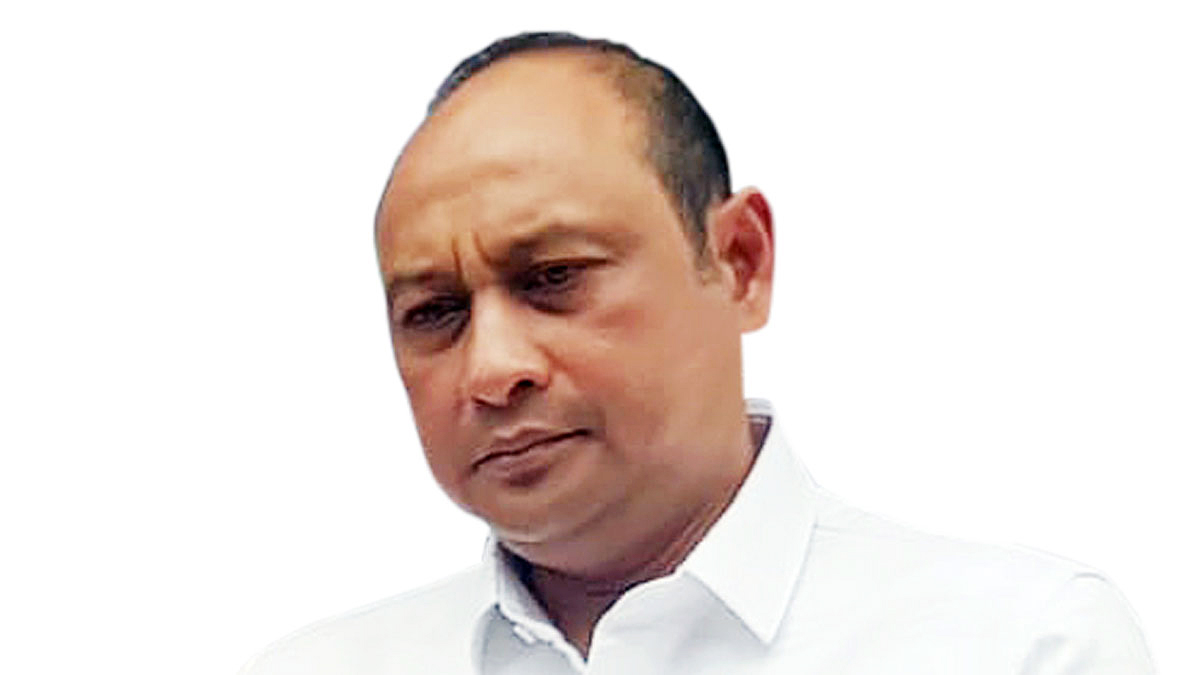
Brig. Gen. Pipit Rismanto in Serang, Banten, October 31, 2022. TEMPO/Joniansyah Hardjono
Law No. 4/2009 on mineral and coal mining requires all IUP and special IUP holders to have and report their RKAB to the government every year. The RKAB should contain, among others, a company’s mining quota and coordinates. Furthermore, IUP and special IUP holders must have an IPPKH if they mine within a forest area.
Tempo and Greenpeace Indonesia’s satellite imagery analysis found that 228.58 hectares have been mined for nickel in the Mandiodo Block throughout 2022, although Antam’s mining area, according to its RKAB approved by the energy ministry last year, only covers 40 hectares. Satellite imagery shows that 90 percent of the mined area lies in the forest.
Lawu’s mining contractors said that there are still great nickel reserves in the forest. According these contractors, concession holders prior to Antam have already exhausted nickel ores in non-forest areas. To reach their target of excavating 75,000 tons per month, they said, they have no other option but to excavate in the forest.
Karya Murni Sejati 27 is among the IUP holders in Mandiodo. According to Karya Murni Director, Tri Witjaksono, there is usually a 1.8-percent nickel content or above in forest areas, meaning, every 1 ton of soil should contain 18 kilograms of nickel ore. For each hectare, Tri added, excavated soil should fill five barges. Considering the scope of the forest area already excavated by Antam throughout 2022, the soil unearthed should have filled 1,140 barges.
Each barge has a capacity of around 7,500 tons, which means that Lawu’s contractors have excavated 8,571,750 tons of nickel. According to the Indonesian Nickel Mining Association (APNI), in 2022, nickel-containing soil was valued at US$50 per ton for a nickel content of 1.8 percent. This information suggests that US$428.6 million, or Rp6.7 trillion, of illegal nickel was sold, referring to an exchange rate of Rp15,600 to the United States dollar.
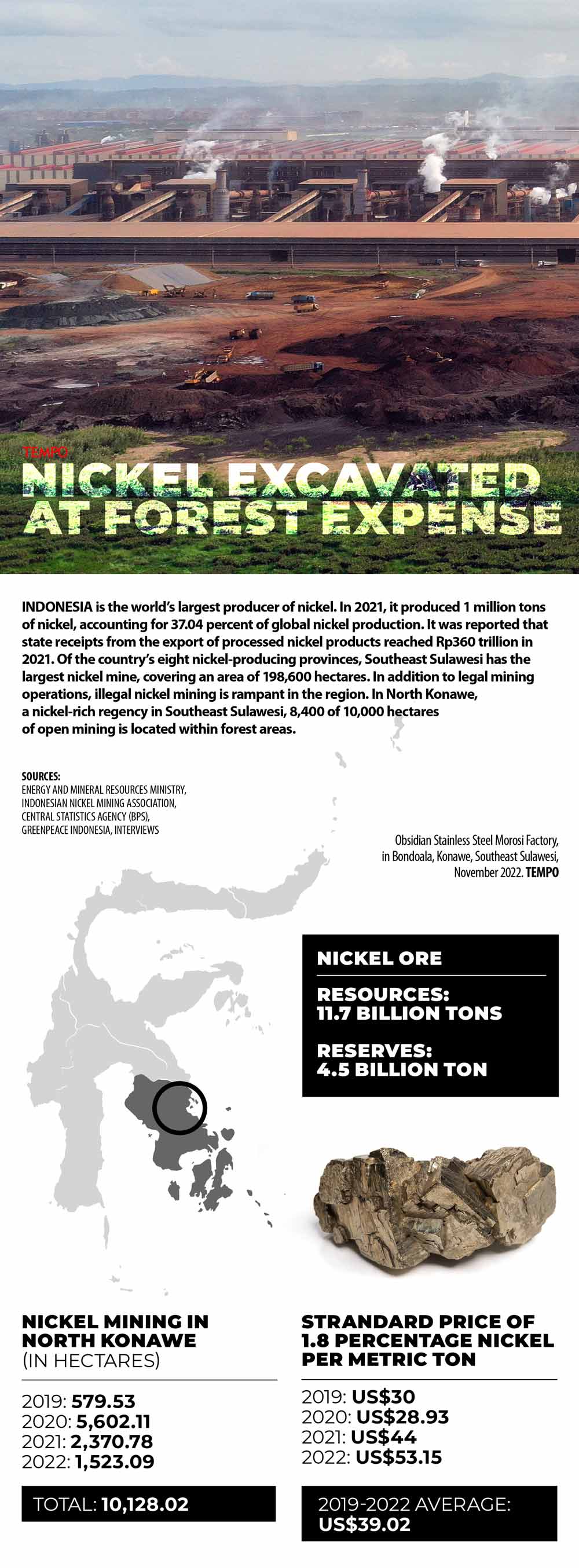
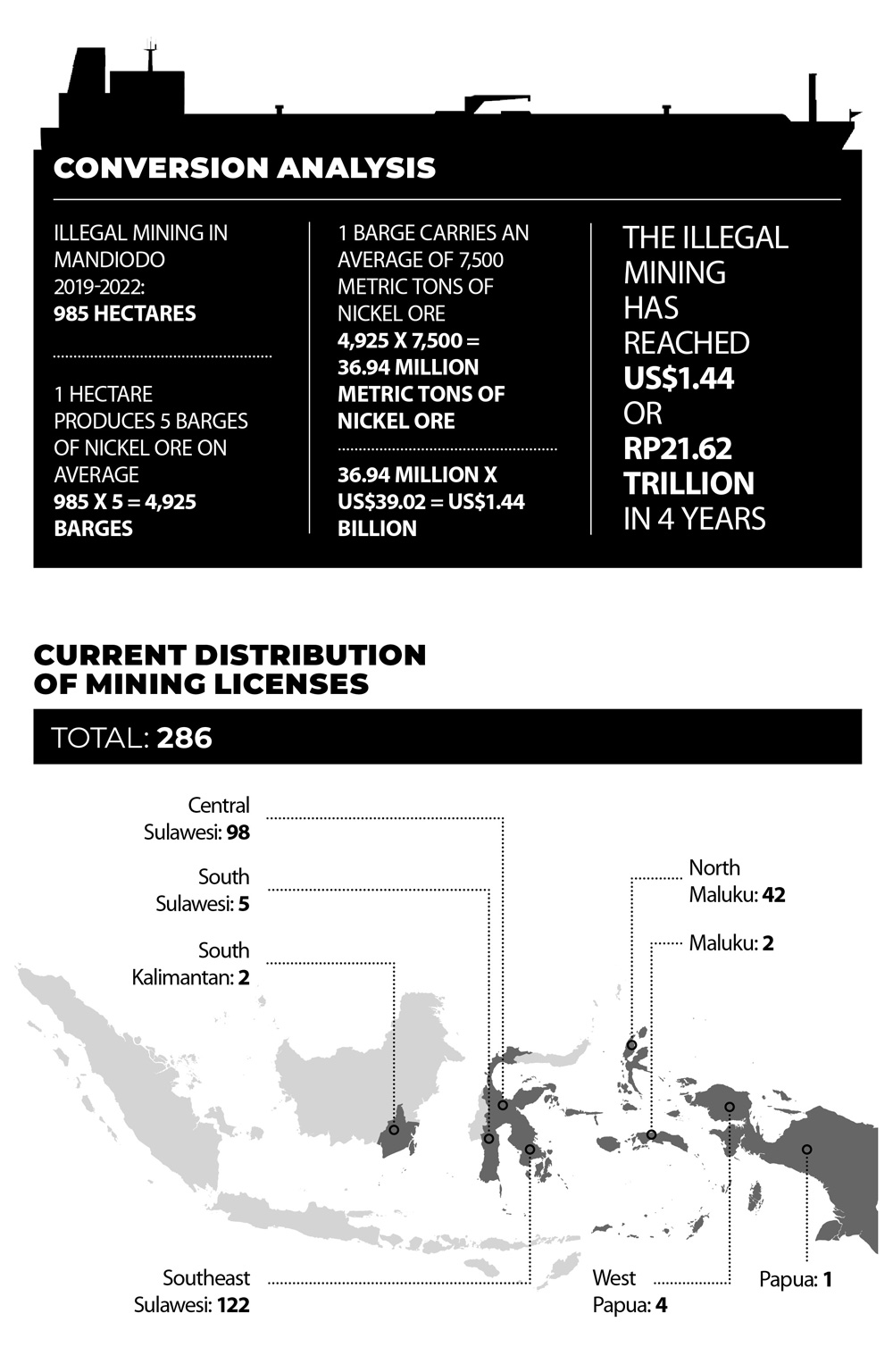
These massive figures surprised La Ode Suryono, Chief Executive Officer (CEO) of Sulawesi Tenggara Regional SOE, which partners with Lawu as Antam’s nickel mining contractor in Mandiodo. According to La Ode, Lawu reported that they only mined 200,000 tons of nickel throughout 2022. “We’re performing an audit on it,” he said.
Based on Greenpeace Indonesia’s analysis of satellite imagery of the Mandiodo Block, nickel has not only been mined in the area in 2022 as mining had begun in 2019. In 2019 to 2022, as many as 1,354 hectares of land was exploited for nickel, meaning, about 36.9 million tons of nickel-containing soil were sold to smelting companies in Morosi and Morowali. If the average value of nickel-containing soil during this period is calculated as US$39.02 per ton, Mandiodo’s mining contractors should have received an earning of Rp21.6 trillion.
Two smelters that purchase Mandiodo’s nickel are Obsidian Stainless Steel in Morosi, Southeast Sulawesi, and Indonesia Ruipu Nickel and Chrome Alloy in the Indonesia Morowali Industrial Park Complex, Central Sulawesi.
Contractors said that Lawu’s management was aware of the entire shipment of illegally mined nickel from Mandiodo. The nickel was successfully delivered to smelting companies because they used documents belonging to companies with mining business permits in North Konawe with complete licenses, including an RKAB and IPPKH. Miners refer to these documents as ‘dokter’, a short for ‘dokumen terbang’ or flight documents.
The documents most used to transport illegal nickel ores belong to Kabaena Kromit Prathama and Mandala Jayakarta. Kabaena’s IUP is for 102.6 hectares in non-forest area in Mandiodo. Meanwhile, Mandala’s IUP is for 107 hectares outside of Mandiodo, or in the Lasolo Islands subdistrict, separated from the Mandiodo Block by the sea and bay.
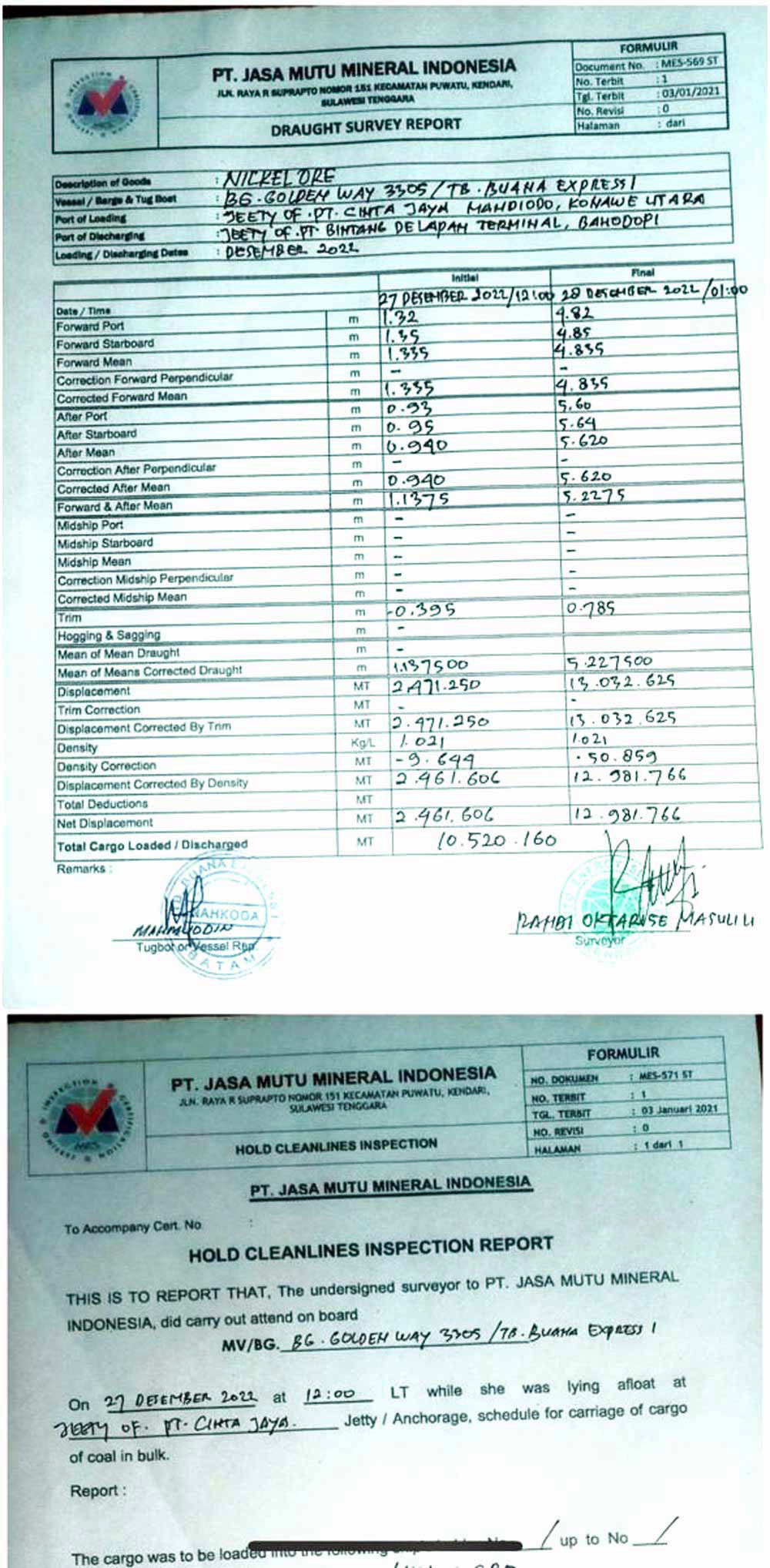
Illegal nickel export documents TEMPO
Thanks to the flight documents of those two companies, Antam’s contractors were able to sell their nickel to smelting companies despite not having a permit. As soon as it arrives at the smelters, Mandiodo’s nickel receives an APL status, rendering an IPPKH unnecessary. The two companies benefit from selling their documents. Antam’s contractors purchase the documents for US$10 per ton of nickel sold to smelters.
Out of the US$10, US$5 is paid for documents and the remaining US$5 for non-tax state revenue (PNBP). Although the PNBP is paid, the state still incurs losses as it does not receive forestry PNBP due to mining activities that have no forest area utilization permit or IPPKH. Forestry PNBP’s rate varies, according to Government Regulation No. 33/2014, depending on the functions of a forest. In Mandiodo, nickel mining has caused deforestation to the area’s protected forest and limited production forest (HPT).
The forestry PNBP rate for the two types of forest comes to Rp3.5 million to Rp4 million per hectare. According to Greenpeace Indonesia’s satellite analysis, Mandiodo lost 985 hectares of forest due to mining in 2019 to 2022. Meanwhile, the entire North Konawe lost 8,400 hectares of forest during those three years, not to mention the loss of forest resources and reforestation funds for timber.
Nickel shipping under Mandala was recorded in a document dated December 31, 2022. The company shipped 10,000 tons of nickel-containing soil through Cinta Jaya’s port in Molawe. The nickel was sent to Bintang Delapan Terminal’s port in Morowali. “If the information is true, we will file a report,” said Yendra, the attorney of Mandala Director, Mandala Yeniayas.
Meanwhile, Kabaena Director Andi Adriansyah denied that his company sold flight documents to ship 8,000 tons of nickel at a 1.8-percent content. According to Andi, his company only sells its own nickel in the amount of 1.5 million tons annually. “We sell nickel at a 1.6-percent content or lower,” he said. Kabaena’s IUP area borders the Mandiodo Block. When Tempo visited the rocky terrain in the third week of November 2022, no mining activity was visible.
The illegal nickel laundering has gone smoothly thanks to a ‘coordination fee’ paid to the police, prosecutors, and ministry law enforcement officials during shipping to smelters. Contractors in Mandiodo, Kendari, and Jakarta admitted to allocating US$16 per ton for so-called coordination. “With all the fees, we only receive US$3 per ton out of the US$50,” said a local contractor.
National Police Director of Special Crimes Brig. Gen. Pipit Rismanto is frequently mentioned as the person supporting these illegal nickel mining contractors. In a video of a police questioning of a nickel contractor, which Tempo managed to obtain, the contractor mentioned Pipit’s name as the law enforcement person protecting their activities.
When Tempo asked Pipit to comment on the illegal mining in Mandiodo, the question sent via WhatsApp somehow reached contractors in North Konawe. Three contractors from different companies flew to Jakarta to confirm the message.
They openly spoke to Tempo about Pipit’s role in backing illegal nickel miners. According to these contractors, Gen. Pipit began intervening in North Konawe’s mines when he sealed Karya Murni Sejati’s mining area in September 2021. Pipit accused Karya Murni’s activity illegal because the company was mining inside Antam’s concession area.
Karya Murni Director, Tri Witjaksonoo, said although the police had sealed and placed a police line at the purportedly illegal mining area, excavation still continued. Tri showed an investigation report by the environment and forestry ministry’s supervisors, dated October 27, 2021, which called Lawu’s mining activity illegal. “Meaning, Lawu had already mined nickel there before it became Antam’s contractor,” he explained.
Brigadier Gen. Pipit Rismanto said he has not been monitoring nickel mining in the area claimed by Karya Murni after he sealed the area. According to him, Karya Murni was illegally mining nickel because the company had lost to Antam in a concession suit at court in 2014. “Their IPPKH was also revoked,” he said.
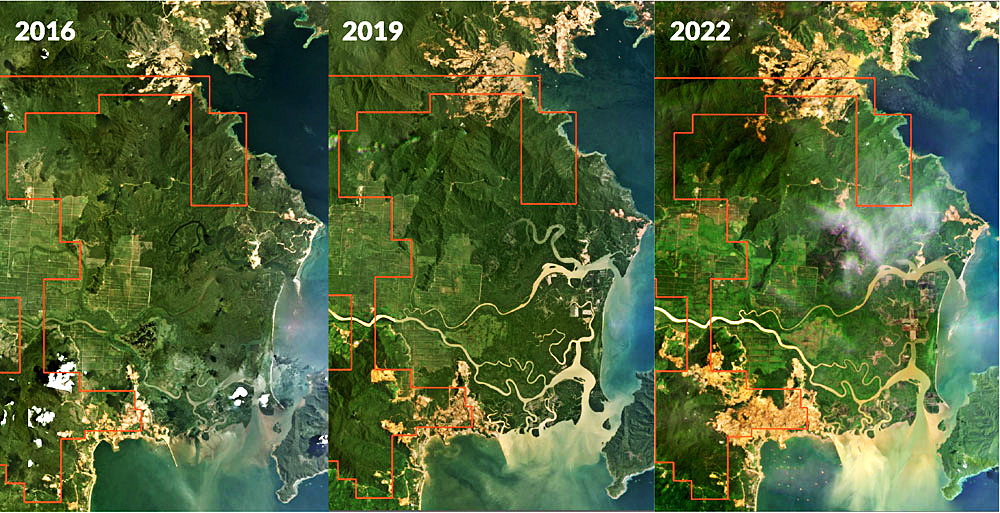
Satellite images show deforestation due to nickel mining in North Konawe, Southeast Sulawesi. Special Photo
In response to his name being mentioned as the figure of authority backing illegal mining, Gen. Pipit asked to have a meeting arranged with his accuser. “Don’t create a rumor that can’t be proven,” he said. “I’ve already instructed law to be enforced. But if the perpetrators are law enforcers outside the police, that’s beyond our jurisdiction.”
Meanwhile, Director-General of Law Enforcement at the Environment and Forestry Ministry, Rasio Ridho Sani, claimed that the fee to ‘coordinate’ with the ministry’s law officers to transport illegal nickel is news to him. “Please tell me who they are,” he said. Southeast Sulawesi Prosecutor’s Office Chief of Legal Information, Dody, refused to comment on the alleged bribery to prosecutors, saying that he was on leave.
Antam’s management has not responded to the accusation of paying ‘coordination fees’ to law enforcement in order to sell nickel despite not having appropriate documents. Syarif Faisal Alkadrie only said that his company had already asked law enforcement to curb illegal mining in their concession area.

Windu Aji in Brebes, Central Java, December 2018. Communication, Informatics and Statistics Office of Brebes
Windu Aji, a businessman born in Brebes, Central Java, in 1976, said to be Lawu Agung Mining’s owner, did not respond to Tempo’s letter requesting his comments. Our questions sent via WhatsApp were only read. According to his company’s articles of incorporation, Windu owns 95 percent of Lawu’s shares via Khara Nusa Investama.
Windu Aji was once asked by Akbar Faizal to resolve the dispute with Karya Murni Sejati. Akbar is the cousin of Audy Siddieq, a Karya Murni shareholder. Akbar said he invited Windu to his office at the Nagara Institute in February 2022. “He offered us to become a contractor under Lawu,” said Akbar. “He said the company belonged to the National Police chief.”
National Police Chief Gen. Listyo Sigit Prabowo did not reply to Tempo’s confirmation on Windu’s claim. Meanwhile, Lawu’s management sent a response letter on behalf of its public relations division without a signature. In the letter, Lawu’s management claimed it has suffered losses due to illegal nickel mining in the Mandiodo Block. “We will be firm in catching illegal miners,” wrote the company.




